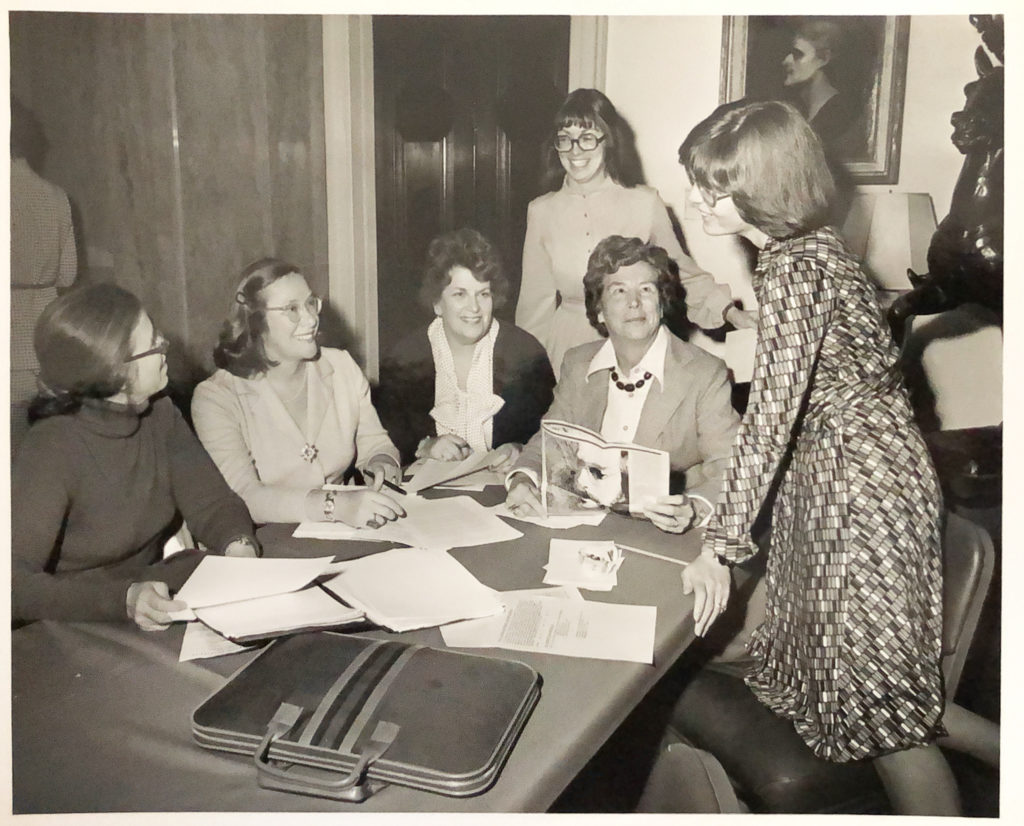In 1976, AAFSW established the FORUM, an AAFSW “think tank” which has had an enormous effect on the Foreign Service thanks to the reports and recommendations it has produced and the actions which these reports and recommendations precipitated.
The FORUM helped to establish a number of basic tenets:
- Families deserve information.
- Education is of great interest to families.
- Spouses want/need to work.
- The mental health dimension needs more attention.
- Our families need special support in times of political or personal stress.
Of course, this is not very revolutionary, but at the time, these ideas needed to be promoted. In its first year, the FORUM sent out 9,000 questionnaires asking about people’s concerns.

We did that work in this format for about a year and then I remember Hope coming into one of the meetings and informing us that new leadership was coming on at AAFSW. She asked me in particular to please come. She was a stalwart member of AAFSW which was the old traditional lady’s aid society kind of organization for Foreign Service women, although they would not have appreciated that description. That was the way I looked at them. Hope asked me to come to one of the meetings and to explain my concerns. That this new president was coming in and she thought maybe there was a chance of doing something. And I remember her saying, “Stephanie, you must work. You must give the traditional organs a chance. You can’t just dismiss them. You can’t act as though they don’t matter because they do.
Stephanie Kinney
It was an extraordinary departure for the president of AAFSW to engage in this kind of activity because what I proposed to them and what Lesley accepted was the formation of the AAFSW Forum on the Concerns of Foreign Service Spouses and Families. And that was the beginning of the Forum.
Stephanie Kinney
S009_01_1976_Oct_Forum-questionnaire_AAFSW-newsletter
S009_02_1976_Dec_Forum-questions_AAFSW-newsletterWe sent out a questionnaire to 9,000 people overseas. Of course, some went to bachelors who would write back and say, “No, sweetie, not interested.” (laughs) People really answered these questions quite well, and from the responses to the questions, we developed the composition of the Forum, which was this: We had a Family Life Study, which was children, climate, languages and all the rest of it
Lesley Dorman
S009_03_1976_Dec_Forum-prelim-report_AAFSW-newsletterWe sent out a very open-ended questionnaire, again Cynthia and I cooked this up, to get the Forum started. The report itself was written in response to letters and phone calls and anecdotal information that we received as a result of another questionnaire. This one was a one-pager and again I remember being over at Cynthia’s house until I thought we were going to go crazy. We sent out over a thousand of them overseas this time. The other one had been done in the Department. This was sent exclusively overseas. It was very open-ended. We in essence said, “Tell us what you’re worried about. Tell us what’s good. Tell us what’s bad. Tell us if there are any particular problems that you’re facing as a result of being the wife of a Foreign Service officer.
Stephanie Kinney
There was nothing scientific about it. It could only be described in scientific terms as anecdotal information. But there was a distinct pattern, and as we would read through these things, we would begin. One, we saw and heard echoes of our own experiences and anxieties and anguish and frustration and so forth. We were gratified that there was a lot that was positive in it and we wanted to make sure to emphasize that portion of it. But there were a lot of problems and they began to fall into a pattern. And so as we began to read these responses, that’s how we formed the basis for the organization of the report based on what we got back. We met with women in Washington. We had these meetings at the George Mason Center and took notes and listened and so forth. We consulted the wives’ senior generation. I remember Betty Atherton and Jean Newsom. The really splendid senior wives at the time who had lived the traditional lives of Foreign Service wives, but wanted something better, something different for the younger generation and were very supportive. Many of them had worked in their own way, had been career people, had to give up careers, one thing or another. And then I remember writing sessions. We would write at home and we would bring our drafts to Jean Vance’s house. I remember one session there. And I remember being devastated because Janet Kennedy absolutely tore up my first draft. She just marked it up one side and down the other. She’s a very good editor. And it came out a better product as a result.
Stephanie Kinney
The AAFSW remains justly proud of its significant role because it was AAFSW that gave its imprimatur to the next survey. Cynthia [Chard], who was crazier than I was, and I did the survey and we got it out. And we collated it and did all the analysis. Because it was done under the auspices of AAFSW, and AAFSW got some of its members to head up different chapters, different committees and those would meet and have discussions. It really was a classic of how to do it right for strategic change. We discovered it and figured it out each step of the way. It wasn’t like we had a playbook. But it was timely, it was inclusive. It was very clear and purposeful.
Stephanie Kinney